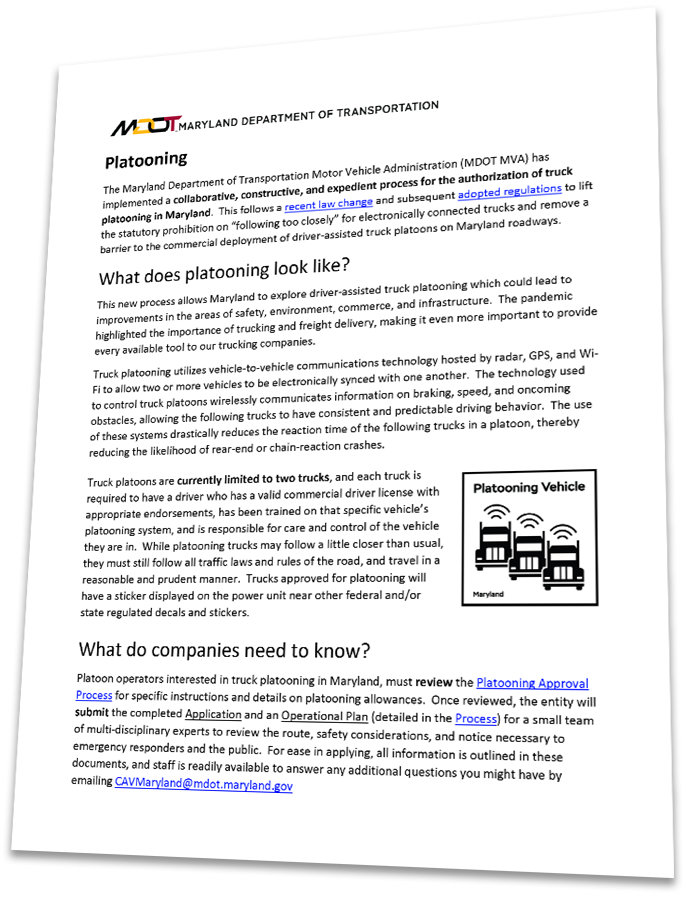Platooning in Maryland
Truck platooning is active in Maryland. This innovative technology can bring improvement to safety, the environment, commerce, and infrastructure to Maryland’s roadways and freight services. The pandemic has highlighted the importance of trucking and freight delivery, making it vital to provide every available tool to our trucking companies.
Particularly for truck platooning operators, all information is outlined here to help you consider this option for your Maryland routes and help you through the collaborative, constructive, and expedient process for the authorization of truck platooning in Maryland. Also, staff is readily available to answer any additional questions you might have by emailing [email protected].
What is Platooning?
- Hosted by radar, GPS, and Wi-Fi
- Wirelessly communicates information on braking, speed, and oncoming obstacles
- Drastically reduces the reaction time of the following trucks in a platoon
- Reduces the likelihood of rear-end or chain-reaction crashes
- Each truck required to have a driver who has a valid commercial driver license with appropriate endorsements
- Each driver has been trained on that specific vehicle’s platooning system, and is still responsible for care and control of the vehicle they are in
- All trucks must still follow all traffic laws and rules of the road, and travel in a reasonable and prudent manner
- Platooning will have a sticker displayed on the power unit near other official decals and stickers
For trucking companies: How to get approved for platooning in Maryland?
Platoon operators have everything you need to get started right here!
Review the Platooning Approval Process for specific instructions and details on platooning allowances
View a map of Maryland’s controlled access highways here; choose “Roadway Access Control – Full Control” to view the potentially allowable routes to include in your Application.
Submit the completed Application and an Operational Plan (detailed in the Process)
Know that a small team of multi-disciplinary experts will move quickly to review and respond, checking:
- Routes to assess interaction with signals, roundabouts, non-auto users, steep grades, high traffic density, and other complexities
- Other safety considerations and notices necessary to emergency responders and the public
- To coordinate with the infrastructure owner operator for appropriate operations
Realize that all approvals will likely include:
- Authorization for up to one year prior to renewal
- Simple monthly progress reports to help both the platoon operator and the MDOT MVA to accommodate different scenarios, encourage the use of truck platooning to enhance safety on Maryland’s roadways, and support economic development of the industry
If you have other trucking permitting needs for trips in Maryland, such as oversize or overweight permits, please click here.
What to Look For in the Future?
Maryland is open for business and eager to realize the life-saving and economic benefits of emerging technology, while ensuring safety for all — embracing technology and innovation through continuing collaboration with partners interested in researching, testing, and implementing connected and automated vehicles in Maryland.
With that, Maryland will stay engaged to sustain platooning and develop enhancements for the future.
The current process and documents are living documents; they will be reviewed regularly through discussions with the Maryland Connected & Automated Vehicles (CAV) Working Group and subgroups and may evolve based on these discussions and developments.
As the technology evolves, platooning in Maryland will be addressed to continue down the path to future deployment beyond this current process. This may include:
- Platoons with more than two trucks,
- Platoons for other heavy vehicles including buses and military vehicles
- Platoons with a human driver in the lead vehicle and an automated driver in the following vehicle
The CAV Working Group includes various stakeholders representing industry, emergency responders, technical experts, and government agencies. If interested in finding out more or participating in these groups, email [email protected].

